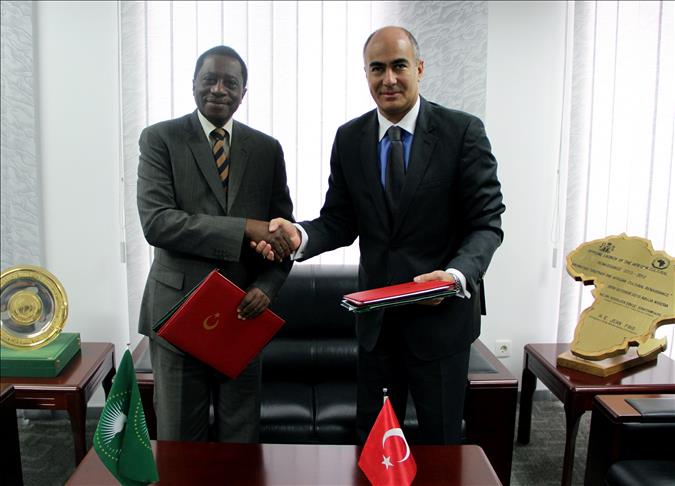
By Addis Getachew
ADDIS ABABA
The Turkish government on Monday donated $1 million in support of anti-Ebola measures undertaken by the African Union (AU) Commission in the afflicted countries of Sierra Leone, Liberia and Guinea.
Turkish ambassador to Ethiopia Osman Riza Yavuzalp and AU Commissioner for Social Affairs Mustapha Sidiki Kaloko signed the agreement on the contribution, which would go to the African Union Support to Ebola Outbreak in West Africa (ASEOWA) during a brief ceremony at the headquarters of the pan-African body.
This contribution agreement brings to fruition a pledge announced by Turkish President Recep Tayyip Erdogan during the Turkey-Africa Summit, which was held in Equatorial Guinea in November, Yavuzalp – who is also permanent representative to the African Union – told The Anadolu Agency.
The donation comes at a crucial time, as surveillance is being strengthened to maintain the trend of Ebola containment and reduction until the disease that killed about 10,000 people in the three most affected countries is eradicated.
This latest outbreak of the deadly virus first began in Guinea in December 2013 and quickly spread to neighboring Sierra Leone and Liberia.
"We are pleased that Turkey is providing this amount of $1 million to the ASEOWA, which is the African Union’s mechanism to fight the Ebola outbreak," Yavusalp said.
"The main aim [of the donation] is the three most affected countries," he said, adding that "these are brotherly countries to us like all other African countries and we want to do our share so that the Ebola outbreak in Africa is eradicated and people are no longer losing their lives."
The Turkish diplomat went on to assert that his country has been a good friend to Africa in good times and bad, which is why "last year when [the] Ebola outbreak was at its highest levels, we still held our summit with our African friends in [Equatorial Guinea's] Malabo," Yavusalp said.
"We didn’t postpone it; we wanted to hold it because we wanted to give the world the message that Africa is not alone; this is not an African problem, this is a global health problem, and all humanity must be together in fighting this," he added.
Asked about the prospect of future support, Yavusalp said: "we are going to work more on this, because cooperation in the field of health is also part of our activities [as per the Malabo declaration]."
Turkey, according to the ambassador, would carry on with its support to the three affected countries, "not only on the African Union track, but also on the bilateral tracks."
Ebola Subsiding
Kaloko, for his part, told the press after the signing that Ebola was increasingly subsiding, noting that intervention against Ebola should be strengthened to the maximum.
"Turkish support came at the most crucial time," Kaloko said, adding that he hopes to "see the end to Ebola by the end of September this year."
This would be the time when "we should be registering zero [Ebola] cases."
"We are now thinking of putting institutions in place for enhanced Ebola surveillance,” he said, adding that one of such efforts would be the creation of CDC, the African equivalent of the U.S. Center for Diseases Control, under the auspices of the African Union Commission," he said.
"We are thinking of an African health corps," he added, noting that it would enable the AU "to react to [other] emergencies, not just Ebola."
Another important thing for the African CDC is to prepare a mechanism to face future emergencies, he added.
"If you recall the onset of the epidemic, we had a lot of negative reaction – people closing borders, flight cancellations, even ports, marine activity was almost down to zero," Kaloko said.
"There were international health regulations that were put forth by WHO very earlier on….But African countries did not actually know or did not want to appropriately follow the regulations put by WHO for different reasons."
"So one of the function of CDC is to advise Africans – governments and administrations – on the significance of some of these regulations," he said.
According to the commissioner, the African CDC will be established by mid-2015.
Anadolu Agency website contains only a portion of the news stories offered to subscribers in the AA News Broadcasting System (HAS), and in summarized form. Please contact us for subscription options.

